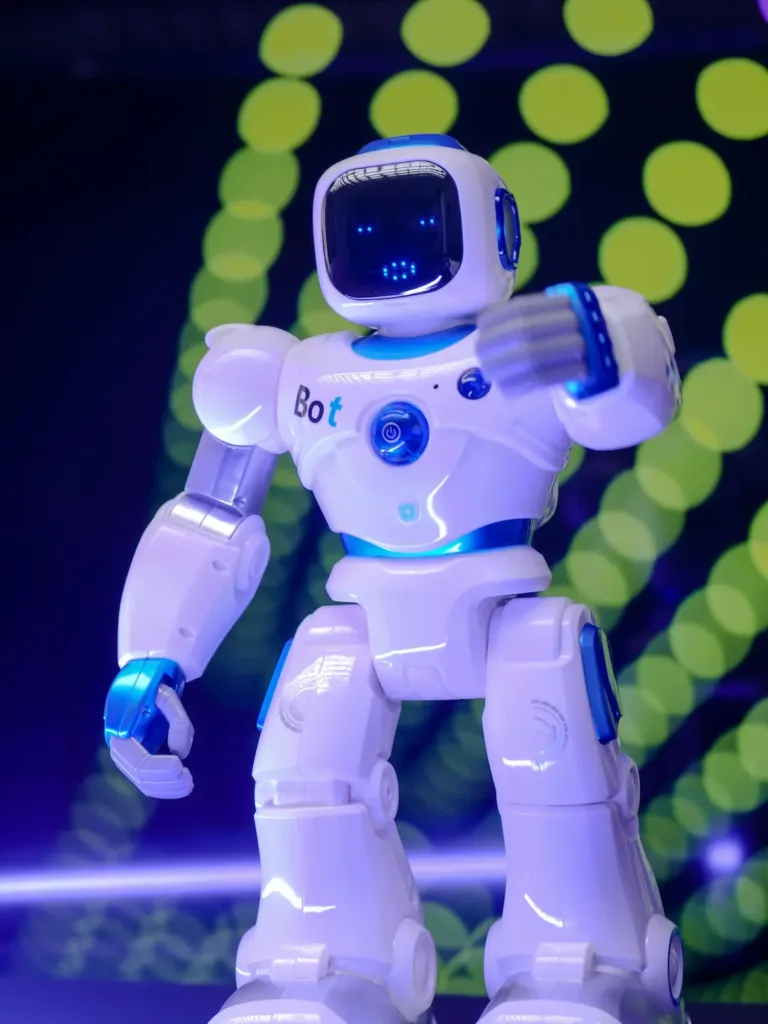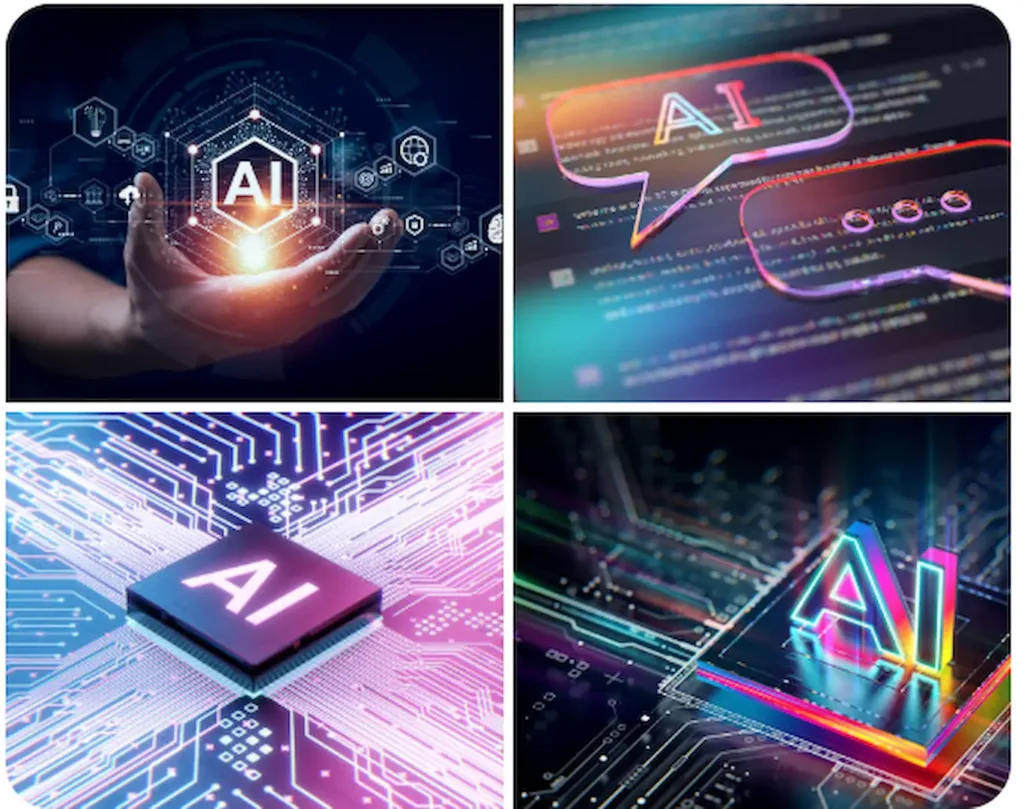
Early Robotic by Kindle Media
Introduction
In today’s fast-paced digital landscape, artificial intelligence (AI) has become a powerful force driving technological advancements across industries. Once confined to science fiction, AI is now a reality, influencing how we interact with technology daily. From AI-powered voice assistants like Siri and Alexa to AI-driven algorithms optimising logistics and enhancing healthcare, the presence of artificial intelligence in modern technology is undeniable. AI’s integration with various forms of technology is reshaping industries, improving our daily lives, and revolutionising entire sectors.
This blog post will explore how AI is fundamentally transforming the future of technology. We’ll delve into the historical evolution of AI, its modern-day applications, and its impact on various industries, including business, healthcare, transportation, entertainment, and even ethical challenges. By the end, you’ll have a deeper understanding of how AI is changing the world of technology and its vast potential for the future.
1. The Historical Evolution of AI in Technology
Artificial intelligence has come a long way since its inception in the 1950s. The early days of AI were marked by theoretical concepts and experiments by pioneers such as Alan Turing, who introduced the Turing Test—a way to evaluate a machine’s ability to exhibit intelligent behaviour. While AI concepts were being explored, the technology of the time was not advanced enough to bring these ideas to fruition.
The turning point came in the 1990s and early 2000s when computer processing power increased exponentially, allowing AI algorithms to become more sophisticated. Machine learning, a subset of AI that enables machines to learn from data without being explicitly programmed, became a game-changer. Developing neural networks further enhanced AI’s capabilities, particularly in speech recognition, image processing, and natural language understanding.
AI went from a theoretical possibility to practical applications, starting with rule-based systems and evolving into complex deep learning models. Today, AI is no longer limited to academia; businesses, governments, and consumers use it in various ways. This historical context helps us appreciate the rapid pace at which AI has evolved and its growing role in technological advancements.
2. AI in Everyday Devices: Enhancing User Experiences

Talking on the phone, while still working on laptop
In the modern world, AI is ubiquitous in the devices we use every day, from smartphones to home assistants. Apple’s Siri, Amazon’s Alexa, and Google Assistant have become household names, each powered by AI to simplify daily tasks. Whether you’re asking your assistant for weather updates, playing your favourite song, or setting reminders, AI-powered voice recognition makes these interactions seamless.
Moreover, AI in smartphones is not limited to voice assistants. Machine learning algorithms power features like facial recognition, image optimisation, and battery management. For instance, the iPhone uses AI to improve photo quality by automatically adjusting settings based on the scene, such as low-light conditions or action shots.
Another exciting application of AI is in smart home technology. Devices like smart thermostats, security cameras, and even smart fridges use AI to learn user habits and make intelligent decisions. For example, smart thermostats can learn your preferred temperature settings and automatically adjust them, saving energy and providing comfort without requiring manual input.
In addition, AI is driving innovations in wearable technology, particularly in fitness trackers and smartwatches. These devices use AI algorithms to monitor heart rate, sleep patterns, and physical activity, providing users with personalised health insights. Integrating AI into everyday devices enhances user experiences and makes technology more intuitive and personalised.
3. AI in Business: Automating and Optimising Workflows
Artificial intelligence plays a transformative role in the business world, driving efficiency, productivity, and decision-making. Businesses are harnessing the power of AI to automate repetitive tasks, analyse large datasets, and even predict market trends. This transformation has far-reaching implications for profitability and how businesses operate in the digital age.
One key application of AI in business is in process automation. Repetitive tasks such as data entry, report generation, and customer service interactions can now be automated using AI-powered bots. AI-based chatbots, for instance, can provide 24/7 customer service, answer common queries, and even resolve issues without human intervention. This not only improves customer satisfaction but also reduces operational costs.
AI also plays a crucial role in data analysis and decision-making. Companies today generate vast amounts of data, from customer behaviour to supply chain metrics. AI algorithms can analyse this data in real time, identifying patterns and insights that would be impossible for humans to detect manually. For example, AI-powered analytics platforms help businesses make informed decisions about product launches, marketing campaigns, and inventory management.
Another significant development is the use of AI in predictive analytics. AI can predict future trends by analysing historical data, such as consumer demand or market shifts. This allows businesses to stay ahead of the curve, adjust their strategies, and optimise their supply chains to meet demand efficiently. Retailers like Amazon use AI to predict customer preferences and recommend products, increasing sales and customer engagement.
Moreover, AI is making strides in human resources management. Recruitment platforms now use AI to screen resumes, assess candidate skills, and match potential employees with job openings. AI can also analyse employee performance data to provide insights into productivity and engagement, helping companies optimise their workforce.
As AI continues to evolve, its role in automating and optimising business workflows will only expand, making businesses more agile, efficient, and competitive in the global marketplace.
4. AI in Healthcare: Revolutionizing Patient Care and Medical Research
The healthcare industry is undergoing a digital revolution, and AI is at the heart of this transformation. From diagnostics to treatment planning, AI enables healthcare providers to deliver more accurate, efficient, and personalised care. The integration of AI in healthcare has the potential to save lives, reduce costs, and improve the overall quality of care.
One of the most significant contributions of AI to healthcare is in medical diagnostics. AI-powered systems are now being used to analyse medical images such as X-rays, MRIs, and CT scans to detect abnormalities the human eye might miss. For instance, AI algorithms have been developed to detect early signs of diseases such as cancer, Alzheimer’s, and heart disease with remarkable accuracy. These diagnostic tools enable earlier detection and treatment, improving patient outcomes.
AI is also transforming the field of personalised medicine. By analysing patient data, including genetic information, lifestyle factors, and medical history, AI can help doctors tailor treatment plans to individual patients. This personalised approach ensures patients receive the most effective treatments based on their unique circumstances. For example, AI-driven platforms can recommend the best course of chemotherapy for cancer patients based on their genetic profile and response to previous treatments.
In addition to diagnostics and treatment, AI is playing a pivotal role in drug discovery and development. Developing new drugs is time-consuming and expensive, often taking years of research and clinical trials. However, AI is streamlining this process by analysing vast biological data to identify potential drug candidates. AI algorithms can simulate how different molecules interact with the human body, helping researchers identify promising compounds more quickly. This accelerates drug development, potentially bringing life-saving treatments to market faster.
AI is also being used to optimise hospital operations and patient care. For example, AI-powered scheduling systems can predict patient demand, ensuring that hospitals are staffed appropriately. AI algorithms can also analyse patient data to identify those at risk of complications, allowing healthcare providers to intervene early and prevent adverse outcomes.
While the integration of AI in healthcare is still in its early stages, the potential benefits are enormous. As AI technology advances, we can expect to see even more innovative applications that improve patient care, enhance medical research, and reduce healthcare costs.
5. AI in Transportation: The Rise of Autonomous Vehicles and Smart Cities
The transportation industry is undergoing a significant transformation thanks to AI-driven innovations. From autonomous vehicles to smart traffic management systems, AI is revolutionising how we move from one place to another. These advancements are not only improving efficiency but also enhancing safety and sustainability.
One of the most exciting developments in transportation is the rise of autonomous vehicles. Companies like Tesla, Waymo, and Uber are at the forefront of developing self-driving cars that use AI to navigate roads, avoid obstacles, and make real-time decisions. These vehicles rely on a combination of sensors, cameras, and AI algorithms to interpret their surroundings and operate without human intervention. The potential benefits of autonomous vehicles are vast, including reduced traffic accidents, lower emissions, and increased accessibility for individuals who cannot drive.
In addition to autonomous vehicles, AI plays a critical role in developing smart cities. AI-powered traffic management systems use real-time data from sensors and cameras to optimise traffic flow, reduce congestion, and minimise energy consumption. For example, AI algorithms can adjust traffic signals based on traffic patterns, ensuring vehicles move efficiently through intersections. This reduces travel time and lowers fuel consumption and emissions, contributing to more sustainable urban environments.
AI is also used in public transportation systems to improve efficiency and enhance the passenger experience. AI-powered platforms can analyse passenger data to optimise bus and train schedules, ensuring that public transportation is available when and where it is needed most. Additionally, AI can provide real-time information to passengers, such as estimated arrival times and route changes, improving convenience and reducing wait times.
While the full potential of AI in transportation is still being explored, it is clear that these technologies will play a key role in shaping the future of how we travel. As autonomous vehicles and smart cities become more prevalent, AI will continue to drive innovation, making transportation safer, more efficient, and more sustainable.
6. Ethical Challenges of AI in Technology
As AI becomes increasingly integrated into our daily lives, it brings various ethical challenges. Issues such as data privacy, algorithmic bias, and the displacement of jobs are at the forefront of discussions about the responsible use of AI. While AI can potentially improve society in many ways, it is essential to address these ethical concerns to ensure that AI is developed and used in a way that benefits everyone.
One of the most pressing ethical issues in AI is data privacy. AI algorithms often rely on vast amounts of personal data to function effectively, whether it’s analysing shopping habits or diagnosing medical conditions. However, this reliance on data raises concerns about how that information is collected, stored, and used. Companies must be transparent about their data practices and protect individuals’ privacy.
Another ethical challenge is algorithmic bias. AI algorithms are trained on large datasets, and if those datasets contain biased information, the AI system may produce biased results. For example, facial recognition systems have been criticised for having higher error rates for people with darker skin tones, leading to concerns about fairness and discrimination. To address this issue, developers must ensure that AI systems are trained on diverse and representative datasets.
Finally, the rise of AI has raised concerns about job displacement. As AI automates tasks that humans once performed, there is a risk that certain jobs may become obsolete. While AI has the potential to create new jobs in fields such as AI development and data analysis, it is essential to consider how workers in industries affected by automation can transition to new roles.
By addressing these ethical challenges, we can ensure that AI is developed and used to benefit society as a whole. Governments, companies, and researchers must work together to establish guidelines and regulations that promote the responsible use of AI while encouraging innovation.
7. The Future of AI in Technology: What Lies Ahead
The future of AI is incredibly promising, with advancements in technology poised to push the boundaries of what AI can achieve. One of the most exciting developments on the horizon is the rise of quantum computing, which has the potential to revolutionise AI by providing unprecedented processing power. Quantum computers can solve complex problems that are currently beyond the capabilities of classical computers, opening up new possibilities for AI in areas such as drug discovery, climate modelling, and cryptography.
In addition to quantum computing, the future of AI will likely see further advancements in natural language processing (NLP). AI systems are already capable of understanding and generating human language. Still, the next generation of NLP models will be even more sophisticated, enabling more natural and intuitive interactions between humans and machines. This could have significant implications for customer service, healthcare, and education industries.
Another exciting area of development is AI in robotics. AI-powered robots are already being used in industries such as manufacturing and logistics. Still, as AI technology improves, we can expect to see robots that are even more capable and versatile. These robots could assist with tasks such as elder care, disaster response, and space exploration, further expanding the role of AI in society.

Artificial Intelligence Future Technology – Stock Photos
Finally, the future of AI will be shaped by continued advancements in machine learning. As AI systems become more adept at learning from data, they can perform increasingly complex tasks with minimal human intervention. This could lead to the development of AI systems that are capable of solving some of the world’s most pressing challenges, from climate change to disease eradication.
Conclusion
Artificial intelligence is not just a trend but a transformative force reshaping technology’s future. AI’s impact is far-reaching, from enhancing everyday devices to revolutionising the healthcare, transportation, and entertainment industries. As we move into the future, AI will continue to drive innovation, offering new opportunities and challenges. By addressing ethical concerns and harnessing the power of AI responsibly, we can ensure that AI benefits society as a whole, improving our quality of life and opening up new possibilities for the future.

